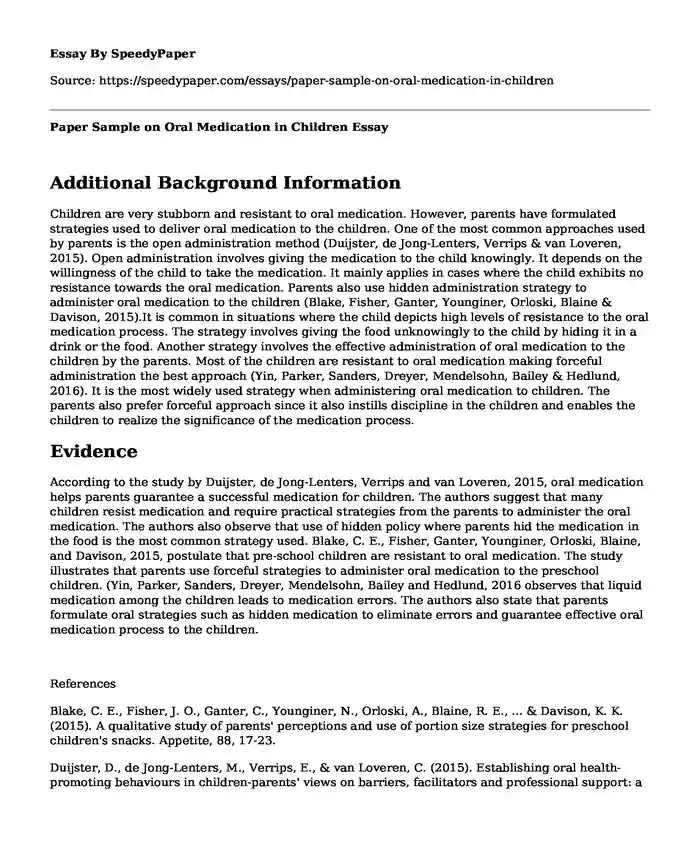Additional Background Information
Children are very stubborn and resistant to oral medication. However, parents have formulated strategies used to deliver oral medication to the children. One of the most common approaches used by parents is the open administration method (Duijster, de Jong-Lenters, Verrips & van Loveren, 2015). Open administration involves giving the medication to the child knowingly. It depends on the willingness of the child to take the medication. It mainly applies in cases where the child exhibits no resistance towards the oral medication. Parents also use hidden administration strategy to administer oral medication to the children (Blake, Fisher, Ganter, Younginer, Orloski, Blaine & Davison, 2015).It is common in situations where the child depicts high levels of resistance to the oral medication process. The strategy involves giving the food unknowingly to the child by hiding it in a drink or the food. Another strategy involves the effective administration of oral medication to the children by the parents. Most of the children are resistant to oral medication making forceful administration the best approach (Yin, Parker, Sanders, Dreyer, Mendelsohn, Bailey & Hedlund, 2016). It is the most widely used strategy when administering oral medication to children. The parents also prefer forceful approach since it also instills discipline in the children and enables the children to realize the significance of the medication process.
Evidence
According to the study by Duijster, de Jong-Lenters, Verrips and van Loveren, 2015, oral medication helps parents guarantee a successful medication for children. The authors suggest that many children resist medication and require practical strategies from the parents to administer the oral medication. The authors also observe that use of hidden policy where parents hid the medication in the food is the most common strategy used. Blake, C. E., Fisher, Ganter, Younginer, Orloski, Blaine, and Davison, 2015, postulate that pre-school children are resistant to oral medication. The study illustrates that parents use forceful strategies to administer oral medication to the preschool children. (Yin, Parker, Sanders, Dreyer, Mendelsohn, Bailey and Hedlund, 2016 observes that liquid medication among the children leads to medication errors. The authors also state that parents formulate oral strategies such as hidden medication to eliminate errors and guarantee effective oral medication process to the children.
References
Blake, C. E., Fisher, J. O., Ganter, C., Younginer, N., Orloski, A., Blaine, R. E., ... & Davison, K. K. (2015). A qualitative study of parents' perceptions and use of portion size strategies for preschool children's snacks. Appetite, 88, 17-23.
Duijster, D., de Jong-Lenters, M., Verrips, E., & van Loveren, C. (2015). Establishing oral health-promoting behaviours in children-parents' views on barriers, facilitators and professional support: a qualitative study. BMC oral health, 15(1), 157.
Yin, H. S., Parker, R. M., Sanders, L. M., Dreyer, B. P., Mendelsohn, A. L., Bailey, S., ... & Hedlund, L. (2016). Liquid medication errors and dosing tools: a randomized controlled experiment. Pediatrics, e20160357.
Cite this page
Paper Sample on Oral Medication in Children. (2022, May 09). Retrieved from https://speedypaper.com/essays/paper-sample-on-oral-medication-in-children
Request Removal
If you are the original author of this essay and no longer wish to have it published on the SpeedyPaper website, please click below to request its removal:
- Environmental Destruction Essay Example
- Black Men and Public Place Discrimination, Essay Sample
- Essay Example about Corporate Image and Corporate Corruption
- Essay Example on Development Federalism
- Mythical Portrait of the Colonized Described in Our Free Essay
- Free Essay Sample on Chinese Feminism
- Essay Sample: Critique the Case Analysis of Amazon
Popular categories





